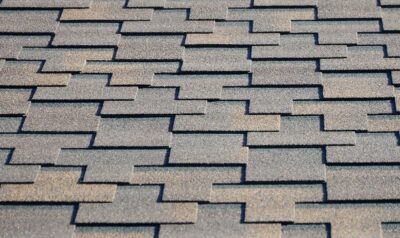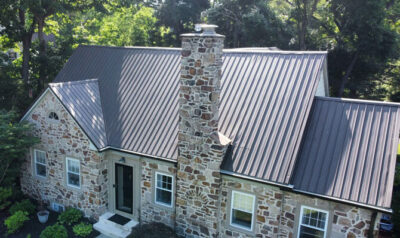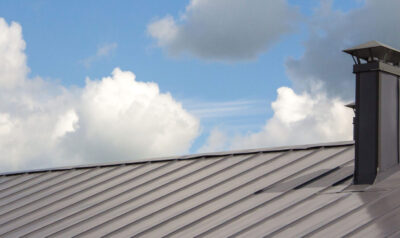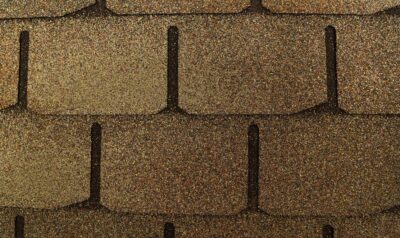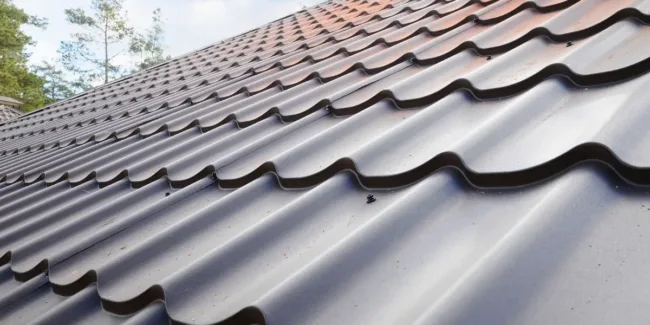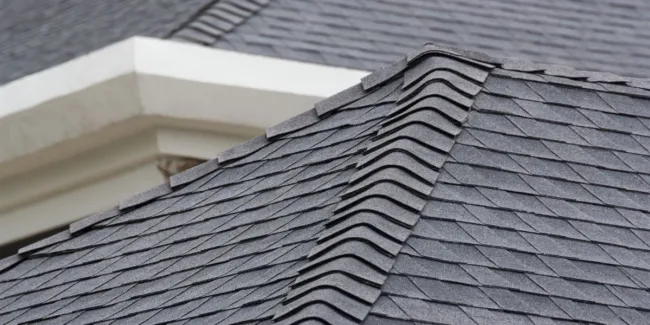How Long Does A Roof Last?
The average roof will last between 15 and 50 years. However, the lifespan of your roof depends greatly on the type of material used, with metal and slate roofs lasting between 50 to 100+ years. Environmental factors and maintenance needs should also be taken into account. Keep reading to learn about the factors that can influence your roof’s lifespan.
Roofing Material Lifespans
| Roofing Material | Average Lifespan (Years) | Key Features |
| Asphalt Shingles | 15–30 | Most common and affordable, susceptible to weather-related wear and tear. |
| Metal Roofing | 40–70 | Durable, resistant to snow and wind, low maintenance. |
| Slate Tiles | 75–100+ | Premium material, highly durable, can last over a century with proper care. |
| Wood Shingles/Shakes | 20–30 | Natural look, requires regular maintenance to prevent mold and rot. |
| Clay Tiles | 50+ | Durable, resistant to fire and weather, prone to breakage during installation. |
Asphalt Shingles: 15–30 Years
Asphalt shingles are the most common and affordable roofing material used in the U.S. with a lifespan of 15-30 years. They are popular due to their cost-effectiveness and ease of installation. However, their lifespan can be on the shorter end of the spectrum, primarily due to risks that arise during extreme weather conditions. Factors like heavy snowfall, strong winds, and drastic temperature changes can lead to faster wear and tear.
Proper maintenance and high-quality shingles can extend their lifespan closer to the 30-year mark. Regular inspections for damaged or missing shingles after storms are crucial to prevent leaks and further damage.
Metal Roofing: 40–70 Years
Metal roofing has become increasingly popular due to its durability and resistance to harsh weather, with a lifespan of 40-70 years. Whether it’s standing-seam panels or metal shingles, this material can withstand heavy snowfall, strong winds, and even hail. Metal roofs are also fire-resistant, which adds to their appeal.
While the upfront cost is higher than asphalt shingles, the long lifespan and minimal maintenance requirements make metal roofing a cost-effective option over time. Regularly cleaning debris and ensuring screws and panels are secure can help maximize their longevity.
Slate Tiles: 75–100+ Years
Slate tiles are a premium roofing material known for their exceptional durability and natural beauty. In most environments, a slate roof can easily last over a century with proper care. The material is highly resistant to water, fire, and extreme weather conditions, making it an excellent choice for long-term investment.
However, slate roofs require professional installation due to their weight and fragility during handling. Routine inspections to check for cracked or loose tiles can help maintain their integrity over decades.
Wood Shingles/Shakes: 20–30 Years
Wood shingles or shakes offer a natural and rustic look, which appeals to many homeowners. However, they require more maintenance than other materials to prevent issues like mold, rot, and insect damage. Humid summers and snowy winters can exacerbate these problems, potentially shortening the roof’s lifespan depending on where the home is located.
Applying protective treatments and ensuring proper ventilation can mitigate these risks. Regular cleaning to remove debris and moss buildup is essential for prolonging the life of wood roofs.
Clay Tiles: 50+ Years
Clay tiles are known for their durability and resistance to fire and extreme weather. They are a less common material due to their higher cost and fragility during installation. While clay tiles can easily last 50 years or more, their weight requires a strong roof structure for support.
Routine maintenance to replace any broken tiles and clean debris will help maintain their longevity. Despite their durability, homeowners should be mindful of potential issues during installation or handling.
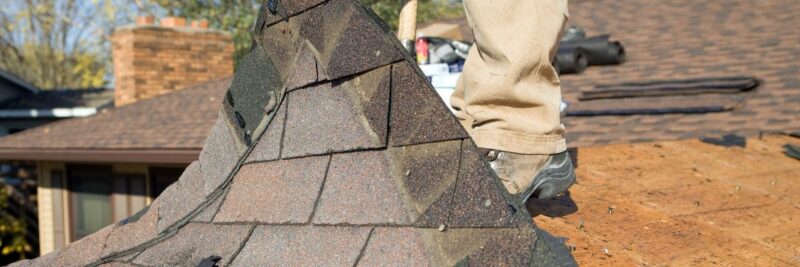
Factors Affecting Roof Longevity
Beyond the type of material used, several factors can impact the lifespan of a roof. These range from unique environmental conditions to quality of installation. It’s important to take each into account when projecting the lifespan of a home’s roof.
Weather Conditions
Climates with extreme temperature variations, events like heavy snowfall, and freeze-thaw cycles takes a significant toll on roofs. Materials expand and contract due to these temperature fluctuations, leading to cracks, leaks, and structural strain. Ensuring the roof is built to withstand these conditions is crucial for long-term durability.
Installation Quality
No matter how durable the material, improper installation can dramatically shorten a roof’s lifespan. Proper alignment, sealing, and underlayment are essential to handle challenging weather conditions. Hiring experienced, licensed contractors ensures the roof is installed to meet performance standards.
At Home Genius, we take unique climate conditions into account during every installation project. Our team of licensed professionals ensures every roof is installed with precision and care, maximizing its lifespan and protecting your home for years to come. Contact Home Genius today for a consultation and see how we can help you achieve a durable, worry-free roof!
Maintenance
Regular maintenance is critical for prolonging a roof’s life. Clearing debris, addressing small damages early, and scheduling inspections can prevent costly issues. Without proper upkeep, even the best-installed roofs may degrade prematurely.
Focusing on these factors helps maximize the performance and longevity of any roofing material.
Location/Climate
Climate has a direct and lasting impact on how well your roof performs and how long it lasts.
In Virginia, warm, humid summers combined with heavy rainfall and occasional coastal storms can cause shingles to deteriorate faster, especially in areas near saltwater. Metal roofs or high-quality architectural shingles with reflective coatings help resist corrosion, UV fading, and moisture damage common in this region.
In Pittsburgh, roofs face repeated freeze-thaw cycles, snow accumulation, and icy conditions that can lead to cracking, curling shingles, and ice dams. Metal roofing or asphalt shingles installed with proper underlayment and ventilation perform best against these harsh winters.
Ohio homeowners experience a full range of weather extremes – intense sun, thunderstorms, and freezing winters – that stress roofing materials year-round. Architectural asphalt shingles, standing-seam metal, or composite roofing provide excellent durability against seasonal expansion and contraction.
In Greenville, South Carolina, roofs endure high heat, humidity, and frequent summer storms that can cause curling, granule loss, and algae growth. Reflective metal roofs and algae-resistant shingles help reduce heat absorption and prevent moisture damage.
Across all regions, choosing the right roofing material for local weather, ensuring proper ventilation, and maintaining regular inspections are key to maximizing roof longevity and protecting your investment for decades.
Tips To Extend Your Roof Lifespan
- Conduct Regular Inspections: Schedule inspections at least once a year and after severe weather events to identify and address issues early.
- Clean Gutters: Clogged gutters can cause water to back up onto the roof, leading to leaks and damage.
- Trim Overhanging Branches: Trees near your home can drop branches and debris onto the roof, causing damage over time.
- Repair Damage Promptly: Small issues like cracked shingles or loose tiles should be fixed immediately to prevent more extensive damage.
- Invest in Quality Materials: While premium materials may cost more upfront, their longevity and resilience can save money in the long run.
Conclusion
The lifespan of a roof varies greatly depending on the materials used, quality of installation, and ongoing maintenance efforts. While materials like asphalt shingles may last 15–30 years, premium options such as metal roofing or slate tiles can provide durability for up to a century. However, even the most durable materials can underperform without proper care, especially in challenging climates characterized by extreme temperatures, heavy snowfall, and freeze-thaw cycles.
At Home Genius, we’re committed to providing expert roofing solutions tailored to your home’s unique needs. Whether you’re installing a new roof or maintaining an existing one, our team of licensed professionals ensures precision, quality, and durability.
Don’t leave the health of your roof to chance—contact Home Genius today for a consultation and discover how we can help you achieve a long-lasting, worry-free roof!
Frequently Asked Questions About Roof Lifespans
What is the average lifespan of a roof?
The average roof lasts between 15 and 50 years, depending on the material and quality of installation. Asphalt shingles typically last 15–30 years, while premium materials such as metal, tile, or slate can last 50–100 years or more with proper care.
Which roofing material lasts the longest?
Slate and metal roofs are among the longest-lasting materials. Slate roofs can easily last over 100 years, and high-quality metal roofs often last 50–70 years. Both materials resist moisture, fire, and temperature extremes better than standard asphalt shingles.
How long do asphalt shingles last?
Standard 3-tab asphalt shingles last around 15–25 years, while architectural shingles can last 25–35 years or longer. Their longevity depends on the brand, installation quality, and how well they’re maintained.
How long does a metal roof last?
Metal roofs can last 40–70 years or more, depending on the type of metal (steel, aluminum, or copper) and the quality of coating and installation. Regular inspections and cleaning debris from panels help maximize lifespan.
Do climate and weather affect roof lifespan?
Yes. Roofs in regions with extreme temperature changes, heavy snow, high winds, or salty coastal air tend to wear out faster. Proper ventilation, insulation, and choosing materials suited to your local climate help prevent premature aging.
How can I make my roof last longer?
Regular maintenance is key. Schedule professional inspections once a year and after major storms, keep gutters clear, trim overhanging branches, and repair damaged shingles or flashing promptly. Investing in proper ventilation and insulation also extends roof life.
How do I know when it’s time to replace my roof?
Signs you may need a roof replacement include missing or curling shingles, leaks, sagging areas, visible mold or moss, and excessive granule loss in gutters. If your roof is more than 20 years old, a professional inspection is recommended.
Can a roof be installed over existing shingles?
In many cases, yes. If the existing roof structure is sound and local building codes allow, one additional layer of shingles can be installed. However, a full tear-off is often recommended for better performance and longevity.
Does a new roof increase home value?
Yes. Installing a new roof improves curb appeal, boosts energy efficiency, and reassures buyers about structural integrity. According to national remodeling data, homeowners can recoup 55–70% of the cost of a new roof at resale, depending on material and region.
Do I need a permit to replace my roof?
Most cities and counties require a permit for roof replacements, especially when structural components are altered. A professional roofing company like Home Genius Exteriors can handle all necessary permits and ensure compliance with local building codes.
What maintenance does my roof need each year?
Perform a visual inspection each spring and fall, clear debris and gutters, look for damaged shingles or flashing, and check attic ventilation. Schedule a professional inspection annually or after major weather events to catch hidden issues early.
